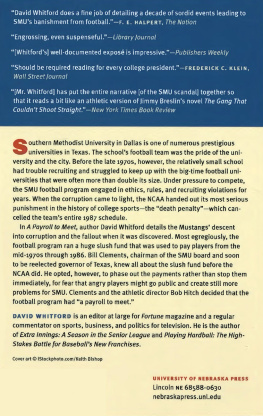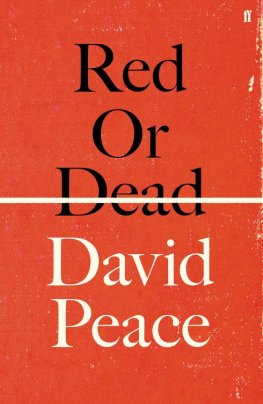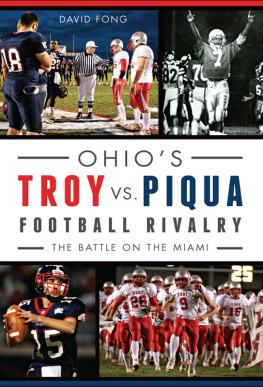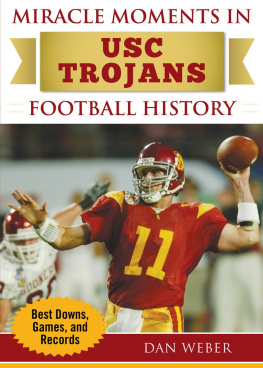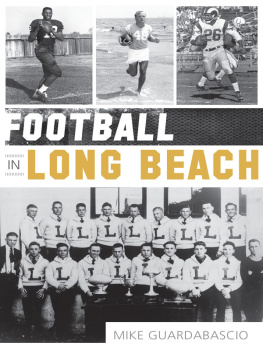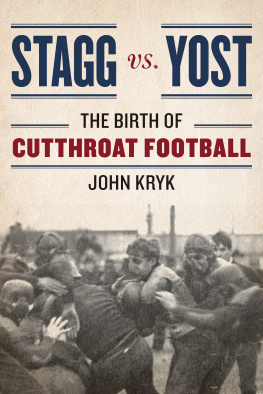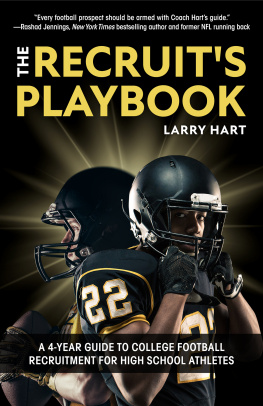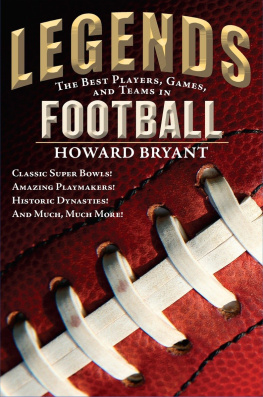A PAYROLL TO MEET
This book is a work of fiction.
Names, characters, places, and incidents either are products
of the authors imagination or are used in a fictional setting.
Any resemblance to actual events or locales or persons,
living or dead, is entirely coincidental.
Source acknowledgments for previously published material appear on p.v.
1989 by David Whitford
Introduction 2013 by David Whitford
All rights reserved
Library of Congress Cataloging-in-Publication Data
Whitford, David.
A payroll to meet: a story of greed, corruption,
and football at SMU / David Whitford; With a new
introduction by the author.
pages cm
Includes index.
ISBN -13: 978-0-8032-4885-4 (paper: alk. paper)
ISBN -13: 978-0-8032-5570-8 (electronic: e-pub)
ISBN -13: 978-0-8032-5571-5 (electronic: mobi)
1. Southern Methodist UniversityFootballEconomic
aspects. 2. SportsCorrupt practicesTexasCase
studies. I. Title.
GV958.S69W48 2013
796.33263097642812dc23 2013015520
The publisher does not have any control over and does not assume any responsibility for author or third-party websites or their content.
INTRODUCTION
While I was living in Dallas in the late 1980s, researching and writing this book, I read in Texas Monthly a memorable essay by native son Lawrence Wright called Why Do They Hate Us So Much? One of the stories Wright told took place during a family road trip in the summer of 1964, when he was a teenager. Somewhere in Florida, they stopped for gas. The attendant noticed the license plate. Where from in Texas? he asked. When Wrights father said, Dallas, the attendant stuck his face up to the window to get a closer look at us. And then he said, You all killed our president.
That reaction endured for years, Wright wrote, even after Memphis and Los Angeles had their own tragedies. Dallasites always begrudged the fact that those cities were never taken down, the way Dallas was, and made to feel at one with Birmingham and Selma.
SMU fans know the feeling. Its been more than twenty-five years since SMU received the so-called death penalty. No reasonable person disputes that, given the rules that govern college athletics, SMU got what it deserved. SMU boosters were paying players and their familiesnot just signing bonuses but actual salaries. SMU coaches knew all about it, and numerous SMU officialsall the way up to Bill Clements, a two-time Texas governor and chairman of the universitys boardwere actively involved in both the payments and the cover-up. It was an outrageous scandal, and it earned SMU what is still the harshest penalty ever levied against a major college football program: a complete one-year ban on competition, followed by a partial ban in year two. ( SMU could have played an away games-only schedule the second year but chose not to, partly out of fear for the safety of the few undersized players who remained.)
Some would argue that paying athletes to perform in contests that are otherwise thoroughly professional shouldnt be a crime in the first place, and theyd have a point. But there was something profoundly dispiriting and exploitational in the whole sordid SMU affair. Two of the players who were paid the mostoffensive lineman Sean Stopperich and linebacker David Stanleygained nothing from their association with SMU, and more likely they were scarred by it. Stopperich never played a single down for the Mustangs. He died of a cocaine overdose in 1995 at age twenty-nine, found face down in the bedroom of his apartment in Pittsburghs West End with a syringe under his body, his hometown paper reported. Stanley did take the field for the Mustangs, however briefly, but he wound up in drug rehab, paid forout of compassion, perhaps, or maybe just because Stanley knew too muchby his SMU sugar daddy. After battling substance abuse for years, Stanley died in his sleep in 2005. He was forty-one.
But again, that was a quarter century ago, and still every time a fresh scandal breaks, SMU is held up as the benchmark. Shouldnt the dark cloud have dissipated by now, as it has for other bad actors, including some whose transgressions dwarf SMUs? Southern Cal seems to have recovered. Yes, Reggie Bush had to give back the Heisman Trophy he won in 2005, after he and his family were found to have accepted payments totaling hundreds of thousands of dollars from an agent. And yes, the Trojans forfeited all the games they won that year and gave up thirty scholarships, but otherwise? USC still plays to big Saturday afternoon crowds at the Coliseum, still wins more games every year than it loses, and in 2012 (after a two-year bowl ban expired) collected $2 million for playing in the Sun Bowl. USC is still USC.
And Penn State? It doesnt get any worse than what happened at Penn State, where a special investigation led by former FBI director Louis Freeh found that the head coach, the athletic director, and the president of the university knew of allegations against assistant coach Jerry Sandusky involving child sex abuse and failed to take appropriate action. (Sandusky was ultimately convicted on forty-five of forty-eight counts.) Penn State was fined $60 million by the NCAA (the Big Ten Conference tacked on an additional $13 million), forfeited all its wins over fourteen seasons from 1998 through 2011, and lost sixty scholarships and the right to play in a bowl game for four years. Practically speaking, that was a harsher set of sanctions than SMU endured, even if it wasnt the death penalty. But Penn State still drew an average of more than one hundred thousand fans to its seven home games in 2012, still had a winning season, and still appeared regularly on national TV, where announcers routinely heaped praise on the loyal Nittany Lion players who could have gone elsewhere to finish their college careers but stayed behind to help rebuild a storied program. Penn State is still Penn State.
SMU now, on the other hand, is nothing close to what SMU once was, and it probably wont ever be that way again. During the first half of the 1980s, SMU won more games than any other Division I football team in the country. It beat up on traditional powers like Texas, Texas A&M, and Arkansas. It played before huge crowds at Texas Stadium (where the Dallas Cowboys used to play) and had its pick of Texass top highschool recruits. But as soon as SMU got nailed, all that disappeared as swiftly as Cinderellas gown.
The NCAAs stated purpose in punishing SMU so severely was to give other potential cheaters something to think about. The theory wasas with the actual death penalty, the one involving lethal injection or an electric chairthat SMUs example would serve as a general deterrent. It didnt turn out that way. The dismal parade of recruiting violations, academic fudging, and general bad behavior by athletes, agents, boosters, coaches, and administrators continues unabated. A quick search of the NCAAs major infraction database turned up hundreds of cases successfully adjudicated since February 1987, when SMU was sentencedincluding two more involving SMU.
One way SMU might have responded in the wake of the scandal could have been to scale back its program or simply opt out of football altogether. There are precedents for that. The University of Chicago was a founding member of the Big Ten Conference in 1896 and won national championships in 1905 and 1913, only to give up football in 1939 after President Robert Maynard Hutchins decided that the whole bloody spectacle had gotten out of hand. College football, Hutchins wrote, had become an infernal nuisance, incompatible with the universitys larger academic mission. After thirty years on the sidelines, Chicago did finally return to the field, but now it competes against colleges like Beloit, Elmhurst, and Rhodes in the NCAAs Division III, which doesnt even allow athletic scholarships.
Next page
